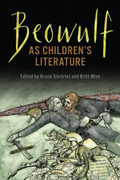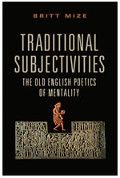Research Interests
Dr. Mize has specialties in both Old English and Middle English literature and language, as well as in medievalism. Through 2024 he served as Editor of the journal Medieval Perspectives and is now the incoming Middle English Editor for the Journal of English and Germanic Philology.
In Old English studies, he has published a book, Traditional Subjectivities: The Old English Poetics of Mentality (University of Toronto Press, 2013), and a series of articles focused on Old English poetry. He has also written on linguistic topics, such as the semantics of an inscription on the 8th-century Franks Casket and the possibility of lexical blending in Old English, as well as on the 10th-century Vercelli Book manuscript, and has a new article on Beowulf translation during the 1830s.
In Middle English studies, Dr. Mize has published on Chaucer, medieval traditions surrounding Judas Iscariot, and medieval drama, and he has edited seven Middle English plays for The Broadview Anthology of British Literature, The Broadview Anthology of Medieval Drama, and The Broadview Anthology of Tudor Drama. His main current work in Middle English focuses on the 15th-century manuscript of the N-Town Plays.
Dr. Mize’s study of medievalism focuses on the epic poem Beowulf, thus connecting to his scholarship on Old English. He is the content author of the Beowulf’s Afterlives Bibliographic Database and editor (with Dr. Bruce Gilchrist) of the book Beowulf as Children’s Literature (University of Toronto Press, 2021).
He has two current book projects: an essay collection on medieval forms of literary adaptation, in collaboration with Dr. Amber Dunai, and a monograph with the working title “Women and Beowulf: An Elliptical History.”
Research Areas
- Medieval Studies
- Book History
- Medievalism
Educational Background
- Ph.D., University of North Carolina, Chapel Hill, 2003
- M.A., University of North Carolina, Chapel Hill, 1996
- B.A., Baylor University, 1994
Awards & Honors
- Arts and Humanities Fellowship from the Office of the Vice President for Research, 2020-23
- Association of Former Students Distinguished Achievement Award for Teaching, College-Level, 2019
- Wells Fargo Honors Faculty Mentor Award (2018)
- College of Liberal Arts Ray A. Rothrock Fellowship, 2012-15
- College of Liberal Arts Faculty Research Enhancement Award, 2011-12
- Glasscock Center for Humanities Research Faculty Stipendiary Fellowship, 2010-11
- Student-Led Award for Teaching Excellence, spring 2009 and spring 2010
- Office of the Vice President for Research Scholarly and Creative Activities Award, 2008-09
Selected Publications

Bruce Gilchrist and Britt Mize, eds. Beowulf as Children’s Literature. University of Toronto Press, 2021.
Almost from the moment Beowulf found its way into print for adults, adults started refashioning it for children. Yet this violent, darkly philosophical epic, with no prominent child character and whose hero dies at the end, presents serious challenges. Gilchrist and Mize, with their other chapter contributors, explore the history, techniques, and ideological dimensions of bringing Beowulf to child audiences.

Britt Mize. Traditional Subjectivities: The Old English Poetics of Mentality. University of Toronto Press, 2013.
Why is Old English poetry so preoccupied with mental actions and perspectives, giving readers access to minds of antagonists as freely as to those of protagonists? Why are characters sometimes called into being for no apparent reason other than to embody a psychological state? In Traditional Subjectivities, Britt Mize provides the first systematic investigation into these questions of profound importance to understanding the ethical universe of Old English poetry.
Other Publications
- “‘The Game Crooks’: Law, Justice, and the Devils of the Towneley Judgment Play,” Journal of English and Germanic Philology 120 (2021): 177–208.
- “Enigmatic Knowing and the Vercelli Book.” In Riddles at Work in the Early Medieval Tradition: Words, Ideas, Interactions, ed. Jennifer Neville and Megan Cavell (Manchester: Manchester University Press, 2020), 247–64.
- “A College of Mentorship Knowledge: Best Practices in Graduate Advising” (contributor), ed. Alan Baragona, Medieval Perspectives 32 (2017): 75–90.
- “Did Deliberate Lexical Blending Occur in Old English?” Peritia 27 (2016): 99–120.
- “Lexical and Textual Studies on Fulgens and Lucres,” English Studies 93 (2012): 775–808.
- “The Meaning of ‘Fisc Flodu Ahof’ on the Franks Casket,” Notes and Queries 256 (2011): 343–47.
- “Working with the Enemy: The Harmonizing Tradition and the New Utility of Judas Iscariot in Thirteenth-Century England,” Journal of Medieval Religious Cultures 36 (2010): 68–110.
- “The Mental Container and the Cross of Christ: Revelation and Community in The Dream of the Rood,” Studies in Philology 107 (2010): 131–78.
- “Manipulations of the Mind-as-Container Motif in Beowulf, Homiletic Fragment II, and Alfred’s Metrical Epilogue to the Pastoral Care,” Journal of English and Germanic Philology 107 (2008): 25–56.
- “The Representation of the Mind as an Enclosure in Old English Poetry,” Anglo-Saxon England 35 (2006): 57–90.
- “Material Economy, Spiritual Economy, and Social Critique in Everyman” (coauthored with Elizabeth Harper), Comparative Drama 40 (2006): 263–311.
- “Adam, and Chaucer’s Words unto Him,” The Chaucer Review 35 (2001): 351–77.

